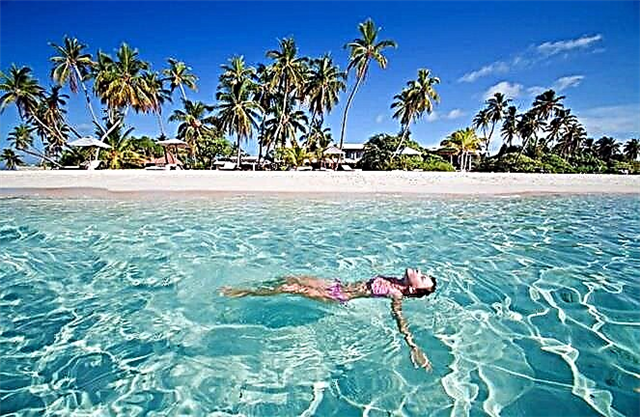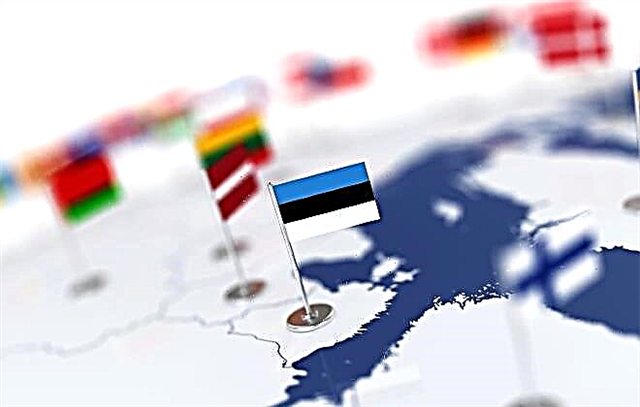Immigration to Estonia for many Russians and residents of other CIS countries is a springboard on the way to the EU. The proximity of territories and mentality, a common Soviet past and a certain absence of a language barrier (many Estonians speak Russian) make this destination attractive to emigrants.

Grounds for immigration
The first thing you need to move to Estonia is foundation. Today the Estonian Citizenship Act provides for several legalization methods for foreigners:
- Getting married. The path is not the easiest, because for the authorities of the Republic, the mere possession of Estonian citizenship by one of the spouses is not enough. They will have to prove that the marriage was not fictitious, and collect a lot of certificates confirming the impossibility of living in the country of citizenship of the second spouse.
- Apparatus employed. This path is complicated by the fact that it will be possible to take only a position for which, within 21 days after the announcement of the vacancy, no applicants were found among citizens or residents of the Republic of Estonia. Requirements for a foreign candidate: relevant education and work experience in the specialty, good health, no criminal record, knowledge of Estonian and / or English. If all the conditions are met, an employment contract is drawn up for a period of one year, on the basis of which the future employee will be able to obtain a work visa, and then a residence permit.
- Reuniting with relatives. The migration authorities of the country are also picky about this method. Only those foreigners whose close relatives need care and guardianship (minors or the elderly) and who have no other close people among Estonian citizens who are ready to take on this task can apply for permanent residence. The process begins with the filing of an application by Estonian citizens to the Ministry of Justice. After receiving approval, they will have to send an invitation to a foreign candidate for a residence permit.
- Education at the university. One of the easiest ways to emigrate with a lot of positive aspects. For example, diplomas from Estonian universities are highly regarded in the EU countries. A residence permit is issued to a student for the entire period of study. In the course of their studies, students are allowed to earn extra money, which means that they can not only improve their financial situation, but also prepare the ground for further employment. After graduation, graduates can immediately apply for permanent residence.
- Investments. One of the most popular ways with which emigration to Estonia from Russia is quite real. To obtain a residence permit (without the right to work), you must invest at least 65 thousand euros in the local economy. The investment does not have to be a state-owned company. It can be a private business. The main thing is that he must work in Estonia for at least 4 years and benefit the Estonian state. Mandatory requirement - the investor must stay in the country for at least 183 days during the year.
- Starting a business. Judging by the reviews of those who have already gone this way, Estonia is particularly liberal in matters of taxation. Income tax does not exceed 21%, and VAT is 18% and is paid only if the total turnover of the company's money exceeds 16 thousand euros per year. Foreign citizens are given the opportunity to register a joint-stock company or limited liability company in the Republic of Estonia; individual entrepreneurship for foreigners is not provided. To open the first one will need 25,000 euros, for the second it will be enough to have 2,500 euros on the account. A prerequisite is the presence of the full amount of the authorized capital in a bank account in Estonia. To register a business, you will need about 3 thousand euros more. If you resort to the services of intermediaries, this amount will double.
- Refuge. This path may turn out to be the longest. It takes several months to process the request. The applicant will have to documentary proof that he is being subjected to racial, political or other persecution in his home country. Russians are rarely granted this status, since the Russian authorities decide on their own about the refugee issue. If, nevertheless, it was possible to obtain asylum, a residence permit will be issued for 2 years with the right to extend it for another 5 years.
Buying real estate does not provide a basis for obtaining resident status in the country. In 1998, an amendment to the Citizenship Act was adopted, on the basis of which children born later than 26.02.1992 and whose parents have lived in Estonia for at least 5 years, can obtain the citizenship of the republic automatically, on the basis of an application from the father and mother.
Take a sociological survey!
[yop_poll id = ”14 ″]
Immigration stages
 The difficulty of immigration to the Republic of Estonia lies in the fact that there is a quota in it. A residence permit is issued annually to no more than 0.1% of the total number of residents of the state.
The difficulty of immigration to the Republic of Estonia lies in the fact that there is a quota in it. A residence permit is issued annually to no more than 0.1% of the total number of residents of the state.
The legalization process takes place in several stages:
- Obtaining a visa of the appropriate category.
- Registration of a residence permit.
- Request for permanent residence.
- Applying for citizenship.
After entering the country, the candidate must rent or buy a home, collect a package of documents and apply for a residence permit to the Police and Border Guard Board. If the decision is positive, the foreigner will be issued a plastic card, which will confirm the applicant's right to temporary residence.
The duration of the residence permit depends on the basis for migration:
- It is issued to the spouses of Estonian citizens for 3 years, after which they can immediately apply for citizenship.
- Labor migrants receive a status for 2 years with the right to extend it for another 5 years.
- The residence permit is issued to relatives of Estonians for 1 year, after which it can be extended for 2–5 years.
You need to submit a request for permanent residence 2 months before the expiration of the temporary status. To obtain citizenship, you must have lived in the country for at least 5 years on the basis of permanent residence.

At all stages of legalization, candidates must meet the following requirements:
- have no tax arrears;
- have no criminal record;
- be physically and mentally healthy;
- not to take part in the activities of criminal and extremist groups.
- pay taxes on time and fulfill other financial obligations to the state.
To become an Estonian citizen, you must fulfill a number of conditions:
- Prove knowledge of the state language of the country (certificate of passing the exam or diploma of graduation from a local educational institution).
- Show a stable income and a permanent job.
- Submit documents for the availability of a place of residence (lease agreement or own housing).
- Pass an examination on the knowledge of the Estonian Constitution.
A mandatory requirement is the abandonment of the previous citizenship.
What documents are needed
 Moving to Estonia for permanent residence should begin with the preparation of documents. The package should include:
Moving to Estonia for permanent residence should begin with the preparation of documents. The package should include:
- Foreign passport with a validity period of six months.
- 2 photos.
- The applicant's questionnaire in duplicate.
- Confirmation of the availability of funds in the bank account.
- Documents confirming the availability of rented or own housing.
- Certificate of passing a language exam or diploma of education obtained in Estonia.
- Health certificate.
- Certificate of absence of violations of the law.
The package of additional documents includes confirmation of the basis for emigration - an employment contract, an invitation from a university, and so on.
All papers drawn up in a foreign language must be translated into Estonian and certified by a notary.
At the stage of obtaining permanent residence, you will need to attach to the package of documents confirmation of a permanent source of income and a valid residence permit.When requesting citizenship, all listed documents must be accompanied by a confirmation of renunciation of the previous citizenship.
How much time and money will it take
 The procedure for how to immigrate to Estonia in terms of time directly depends on the cost.
The procedure for how to immigrate to Estonia in terms of time directly depends on the cost.
So, when applying for a residence permit, you will have to prepare the following budget:
- consideration within 30 days - 99.60 euros;
- 10 days - 241.82 euros;
- 5 working days - 384.18 euros.
If the applicant does not work and is in the care of other relatives, the amount of the fee will look like this:
- 30 days - 71.14 euros;
- 10 days - € 213.43;
- 5 days - 355.72 euros.
The duty is paid through a bank branch in the country's currency. It is worth noting that the time for consideration of the request may be affected by the correctness of the preparation of the package of documents and the presence or absence of points that the Estonian migration authorities would like to clarify.
Why can they refuse
 The consideration of the request does not always end with approval. Often, candidates for temporary or permanent status are rejected. This happens for a variety of reasons:
The consideration of the request does not always end with approval. Often, candidates for temporary or permanent status are rejected. This happens for a variety of reasons:
- the presence of a criminal record;
- suspicion of participation in terrorist or criminal groups;
- incomplete package of documents;
- fake documents;
- insufficient period of residence in the country;
- violations of migration laws in the past;
- fictitious marriage;
- insufficient financial security.
A negative result can always be appealed in court. You need to submit a petition within a month from the date of receipt of the refusal. If the reason turned out to be a banal lack of documents, it is necessary to eliminate the shortcomings and try to apply again. But this can be done no earlier than six months after the first attempt. The law does not limit the number of requests that a foreign migrant can submit.
Choosing a place to stay
 The Republic of Estonia is a small state (about 45 thousand sq. Km) bordering the Russian Federation and Latvia and washed by the Baltic Sea. In addition to the fact that you need to understand well how to leave to live in Estonia, you need to choose the right place for your future residence. This issue should take into account the climate, the chances of finding a job, the cost of living, the availability of opportunities for the development and education of children.
The Republic of Estonia is a small state (about 45 thousand sq. Km) bordering the Russian Federation and Latvia and washed by the Baltic Sea. In addition to the fact that you need to understand well how to leave to live in Estonia, you need to choose the right place for your future residence. This issue should take into account the climate, the chances of finding a job, the cost of living, the availability of opportunities for the development and education of children.
There is practically no corruption in the Republic, the unemployment rate is about 5%, and the average earnings in the regions reaches 1,200-1,300 euros per month.
When choosing a place to live, many migrants are guided by the cities in which the largest number of Russians are concentrated. Today, almost 87% of former Russians live in the northeastern part of the state - Narva, Kohtla-Järve, Sillamäe.
The problem of life in the Republic of Estonia is nationalism, which still exists. Estonians prefer to give jobs to “their own”, refusing migrants, including Russians. It is for this reason that Russians most often go in search of work where there is a Russian business.
When choosing Tallinn, remember that this city has the highest living costs, and the Russian diaspora is not too numerous.
It should also be borne in mind that the climate in Estonia differs in different regions and is transitional from temperate maritime to temperate continental. Weather conditions are due to Atlantic cyclones and the Gulf Stream. Thanks to this, the air is always humid, the summers are cooler and the winters warmer than on the continent. During the winter and autumn months, there is a lot of rainfall and strong winds.
Outcomes
Whether it is worth moving to Estonia needs to be assessed from different angles. A comparative table of the pros and cons of emigration will help in this:
| Advantages | disadvantages |
|---|---|
| Cleanliness and environmental friendliness. | Not a very high level of wages when compared with other EU countries. |
| Good roads, well-functioning transport system. | The standard of living is also not as high as in Western Europe. |
| Estonia belongs to the EU and the Schengen area. | High prices for food and utilities. |
| Lack of megacities. And the country itself is very small, which makes it cozy. | Restrained attitude towards migrants. |
| Higher education in Estonia can be obtained cheaper than in other European countries, and diplomas from Estonian universities are highly regarded throughout Europe. | Strict migration legislation. |
| Territorial proximity to the CIS. | Humid climate with frequent precipitation and many cloudy days |
| A large number of people who understand and speak Russian. | |
| Liberal tax system |











